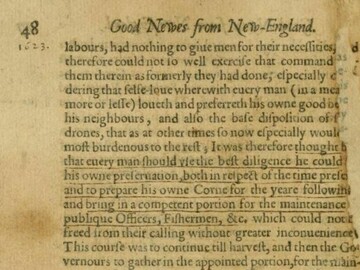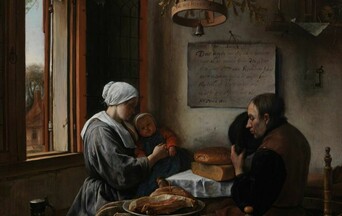A Day of Thanksgiving, Summer 1623
Object ID: BPL Call Number: Adams 252.25 no.1
- Date
- 1623
- Material
- Paper
- Author/Maker
- Edward Winslow (1595-1655)
- Source
Good Nevves From New-England, Or, A True Relation of Things Very Remarkable at the Plantation of Plimoth in Nevv-England (1624)

Good News from New England is provided courtesy of the Boston Public Library. Prayer Before the Meal is provided courtesy of The Leiden Collection.
Description
English communities had many different ways of expressing gratitude at the personal, household, town, and national levels. While some traditions marked moments of significance with feasting and raucous celebrations, “days of thanks giving” could also be solemn occasions marked by quiet reflection and fasting. “Days of thanks giving” could be called to commemorate a military victory, safe arrival after a long journey, or a recovery after illness. In 17th-century New England, communities also came together for days of atonement known as “days of humiliation and prayer” to reflect on past wrongdoings and make amends and “days of thanksgiving” to thank God for his blessings. These “holy days” (or holidays) were not held on a regular basis. Instead, they were generally called on weekdays and meant a day of church services and fasting. In the spring and summer of 1623, a drought threatened the colonists’ harvest and the Governor called for a “day of humiliation and prayer” to beg God’s forgiveness. When the drought ended, they celebrated with a day of thanksgiving.
Good News from New England is provided courtesy of the Boston Public Library.
Transcription
It pleased God, for our further chastisement, to send a great drought, insomuch as in six weeks after the latter setting [of corn] there scarce fell any rain … now were our hopes overthrown, and we discouraged, our joy being turned into mourning… a day was appointed by public authority, and set apart from all other employments; hoping that the same God, which had stirred us up hereunto would be moved hereby in mercy to look down upon us, and grant the request of our dejected souls…before our departure, the weather was overcast, the clouds gathered together on all sides, and on the next morning distilled such soft, sweet, and moderate showers of rain…and therefore another solem day was set apart and appointed for that end; wherein we returned glory, honor, and praise, with all thankfulness, to our good God, which death do graciously with us.
Media
Good News from New England
View PDFTranscription
It pleased God, for our further chastisement, to send a great drought, insomuch as in six weeks after the latter setting [of corn] there scarce fell any rain … now were our hopes overthrown, and we discouraged, our joy being turned into mourning… a day was appointed by public authority, and set apart from all other employments; hoping that the same God, which had stirred us up hereunto would be moved hereby in mercy to look down upon us, and grant the request of our dejected souls…before our departure, the weather was overcast, the clouds gathered together on all sides, and on the next morning distilled such soft, sweet, and moderate showers of rain…and therefore another solem day was set apart and appointed for that end; wherein we returned glory, honor, and praise, with all thankfulness, to our good God, which dealth do graciously with us.

Jan Steen, Prayer Before the Meal, 1660, oil on oak panel. Image provided courtesy of The Leiden Collection.
Discussion Questions
-
What is the difference between this “day of thanksgiving” and the 1621 harvest feast?
-
Based on what you know, would you call the 1621 harvest celebration a “thanksgiving”? Why or why not?
-
Why are the colonists worried about their harvest? What does the Governor decide to do about the drought?
-
How might a community respond to a drought today?
-
How do other world religions practice gratitude and atonement today?